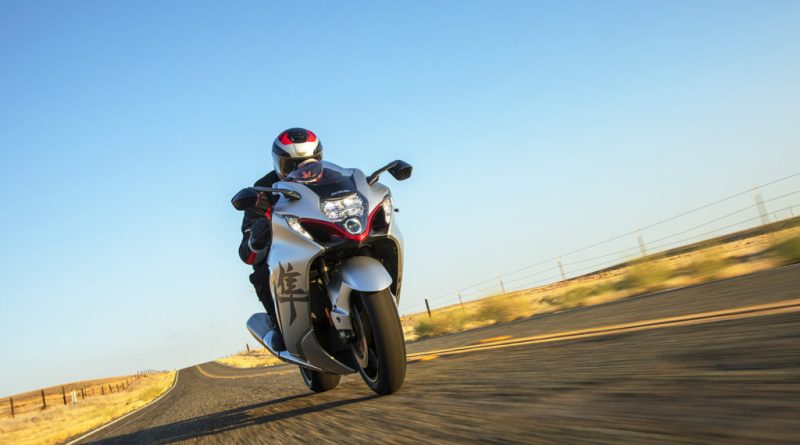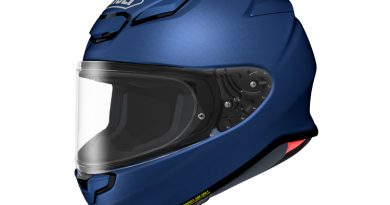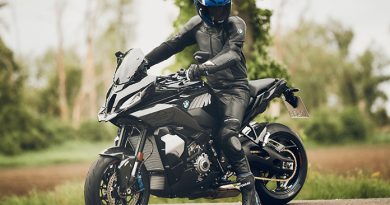2022 Suzuki Hayabusa | Road Test Review
Now in its third generation, the Suzuki Hayabusa was thoroughly updated for 2022. We logged 1,700 miles on public roads and did a dyno test for this road test review. (Photos by Kevin Wing)
Sometimes truth really is stranger than fiction. These days we’ve got three billionaires – Jeff Bezos, Richard Branson, and Elon Musk – trying to one-up each other in the space race. Ever the showman, Branson beat Bezos by a week in their personal quests to become space cowboys. If you want to book a galactic flight, a ticket could set you back a cool $250,000.
What a waste. You can reach hyperspace right here on Earth for less than a tenth as much. Just head down to your local Suzuki dealer and fork over $18,599 for a new Hayabusa. All you have to decide is which color you want your rocket to be.
2022 Suzuki Hayabusa in Metallic Matte Sword Silver / Candy Daring Red
Our test bike is a gorgeous Metallic Matte Sword Silver with Candy Daring Red accents. The ’Busa also looks sharp in Glass Sparkle Black and Candy Burnt Gold, but you can’t go wrong with Pearl Brilliant White and Metallic Matte Stellar Blue either. Ah, the tyranny of choice!
TAKING FLIGHT
Yes, the Hayabusa, along with all other street-legal production motorcycles, has its top speed electronically limited to 186 mph (300 kph). But with some ingenuity – and money – you can go faster. Much faster.
Just ask Becci Ellis. Her husband Mike built a turbocharged Hayabusa, and she rode it to a world-record speed of 264.10 mph in 2014.
For hypersport-touring on the Hayabusa, we added a Nelson-Rigg Commuter Tank Bag and Tail Bag.
Greg’s Gear
Helmet: Fly Racing Sentinel
Gloves: Fly Racing FL-2
Jacket/Pants: Olympia Airglide 6
Boots: Sidi Gavia Gore-Tex
Tailbag: Nelson-Rigg Commuter
Or Bill Warner. He’s a tropical fish farmer from Tampa, Florida, who rode a partially streamlined and turbocharged Hayabusa to a record-breaking 272.340 mph in the standing mile at Maxton AFB in 2010.
California’s Highway 9 winds its way through towering coast redwoods near Santa Cruz.
For mere mortals riding on public roads, the Hayabusa’s speed cap is hardly oppressive. And it’s really no big deal that claimed peak horsepower for the third-gen 2022 model is lower than that of the previous model (188 vs. 194). Peak torque is lower too. What matters is the extra grunt in the midrange, which helps the new Hayabusa accelerate faster than ever.
HYPERSPORT-TOURING
Here at Rider, we gave up quarter-mile and top-speed testing a long time ago. It was just too logistically challenging, and on a bike like the Hayabusa, it would be dangerous and felonious without renting a drag strip. In thrust we trust, and on Jett Tuning’s rear-wheel dyno the big Suzook spun up the drum to the tune of 173 horsepower at 9,800 rpm and 106 lb-ft of torque at 6,900 rpm.
We specialize in motorcycle travel and adventure, so after Tom Montano’s first ride mostly on the track at Utah Motor-sports Campus, we wanted to find out how well the Hayabusa works out on the road, ridden until the low-fuel light comes on.
We logged nearly 1,700 miles for this test (including three 400-mile days) on city streets, on freeways ranging from wide open to rush-hour crowded, and on some of the best riding roads the Golden State has to offer. We burned nearly 44 gallons of premium fuel and averaged 38 mpg; the Hayabusa has a 5.3-gallon tank, so that works out to just over 201 miles of range. Our fuel economy was as high as 42 mpg on mellower jaunts, but it dropped as low as 31 mpg when we pushed hard in the twisties.
Massive intake ducts are part of the Suzuki Ram Air Direct (SRAD) system, which pressurizes the airbox.
As a 582-pound sportbike, the Hayabusa isn’t what you’d call flickable. It’s well-composed, graceful even, and will go where you point it and hold a line dutifully. But effort is required when transitioning back and forth through a tight series of curves, like those on Highway 1 along the craggy Big Sur coast, on Skyline Boulevard along the ridge of the Santa Cruz Mountains, or on Highway 58 as it snakes over the Temblor Range. You have to earn it, and the big reward is lighting the wick on a long, arcing corner exit.
Built in 1932, Bixby Bridge is north of Big Sur on California’s Highway 1.
With a perfectly balanced 1,340cc inline Four, the Hayabusa is remarkably smooth. In fact, it requires care to avoid slip-ping into triple-digit territory without realizing it. At 100 mph in top gear, the engine is spinning at just 5,200 rpm – or so I’m told (wink wink). It redlines at 11,000 rpm. Do the math.
When straight-lining on the freeway, I often used cruise control to avoid speed creep. The Hayabusa also has an adjustable speed limiter, which can be temporarily overridden to allow a quick pass. Both are part of the comprehensive, IMU-enabled electronics suite that was included in the Suzuki’s overhaul for 2022. There are six ride modes (three are preset and three are customizable) that adjust power, throttle response, engine braking, lean-angle-sensitive traction control, wheelie control, and the quickshifter. There’s also launch control, cornering ABS, front-to-rear linked brakes, rear-lift mitigation, hill-hold control, and Suzuki’s Easy Start and Low RPM Assist systems. The only thing missing is a tire-pressure monitor.
When going over a rise, a quick flick of the wrist is all it takes to raise the Hayabusa’s front wheel. Suzuki’s 10-level anti-lift control keeps things in check.
As with state-of-the-art electronics on many motorcycles, they sound more complicated in theory than they are in practice. You can just start the bike and ride it without having to figure anything out, and many of the safety functions operate in the background, called upon only when needed. Changing the ride mode is as simple as pushing a button, and setting and adjusting cruise control is a no-brainer. Customizing the “user” ride modes takes a few extra steps, but even that isn’t difficult. The Hayabusa has a crisp, bright, easy-to-read TFT color display in the center of the dash, and it’s flanked by four analog gauges for road speed, engine speed, fuel level, and engine temperature, the latter two being smaller and having attractive gold bezels.
The instrument panel pairs classic analog gauges with a TFT color display. Everything you need to know is right where you expect it to be.
STRUTTING ITS STUFF
From the gauges to the chrome-plated trailing edge of the fairing, the new Hayabusa is a work of art. Opinions are often mixed regarding its bulbous, aerodynamic shape, but there’s no denying that the bike looks fast even when standing still. A pair of massive ram-air ducts surround the stacked LED headlight. Turnsignals are integrated into the bodywork to reduce drag and visual clutter. Black panels between the bottom of the tank and the massive twin-spar frame are embossed with a pattern inspired by the neck feathers of the Hayabusa’s namesake, the peregrine falcon. That falcon is represented by the large kanji character on the fairing, which is also found atop the headlight shroud and on the TFT at start-up. At sunset, the Metallic Matte Sword Silver paint reflects the light so softly that the bodywork looks airbrushed.
Our test bike’s Metallic Matte Sword Silver paint looks stunning during the magic hour. The Hayabusa kanji symbol, also found on the headlight shroud and TFT, is iconic.
For a long weekend trip up the coast to Sonoma Raceway for the Progressive IMS Outdoors show, I installed Nelson-Rigg’s Commuter tankbag and tailbag. With its stretched-out dimensions and wide, thick seat, the Hayabusa has a reasonably comfortable cockpit. Clip-on handlebars are mounted at the same level as the triple clamp, and after a while the weight on the rider’s wrists becomes tiresome. The bubble-style windscreen projects airflow at chest level, providing some support at speed. Cruise control was a blessing, and a set of bar risers would probably be transformative during long-distance jaunts.
View of San Francisco’s Golden Gate Bridge from Fort Baker.
To allow for generous cornering clearance, the Hayabusa has high footpegs. With a seat height of 31.5 inches, legroom is limited. I’m 6 feet tall with a 34-inch inseam, so there was a sharp bend in my middle-aged knees. Stopping often to take photos of the Hayabusa in scenic locations gave me a welcome excuse to stretch my legs.
While the Hayabusa’s ergonomics are not ideal for long days in the saddle, its creamy smooth engine transmits very little vibration to the rider, and its enormous boxy mufflers keep noise to a dull roar. When hard on the gas, the four-piece band plays a lively tune, but otherwise the Suzuki sounds relaxed and understressed.
Low clip-ons, high footpegs, and a stretched-out cockpit are better suited for sport riding than long distances.
Big, powerful engines pump out lots of heat, and the Hayabusa’s 1,340cc mill is no exception. Its massive curved radiator was redesigned to reduce air resistance and increase air flow for better cooling efficiency. Below it is a second radiator that cools engine oil. Large exhaust vents between the side fairing panels pull hot air away from the engine and around the rider. Even on triple-digit days, the only time engine heat was noticeable was at a stop or riding in slow traffic.
While unmistakably a Hayabusa from a distance, the new model’s bodywork and mirrors were redesigned to be even more aerodynamic. Overall, it looks more cohesive.
STRONG BONES
A robust chassis is necessary to harness enormous power. With architecture inspired by Suzuki’s MotoGP GSX-RR racebikes, the Hayabusa’s twin-spar aluminum frame and swingarm use both cast and extruded sections to optimize strength and tuned flex. The 1.5-pounds-lighter subframe is made of rectangular steel tubing to provide the strength needed to support a rider and passenger.
Panels between the tank and frame are embossed to look like the neck feathers of a peregrine falcon.
The ’Busa’s fully adjustable KYB suspension is responsive and compliant, and it can be softened for comfort or stiffened for sport or track riding. Top-spec Brembo Stylema front calipers squeeze 320mm floating discs, and they provide excellent feel at the lever and hold-your-horses power. The combined braking system adds some rear brake when the front lever is pulled, which helps stabilize the chassis. Cast 17-inch wheels are wrapped in grippy Bridgestone Battlax Hypersport S22 rubber with a neutral profile that helps the Hayabusa turn in smoothly and hold its line.
FAST IS AS FAST DOES
When hypersport-touring on the Hayabusa, scenery tends to blur.
As modern as it is, the Hayabusa feels like a throwback. When you see the latest model parked, you know exactly what it is. It shares an unmistakable family resemblance with the original, paradigm-shifting GSX1300R that debuted more than two decades ago. The top-speed wars are over, brought to an end through diplomacy rather than supremacy (though the Haya-busa was the king when the OEMs laid down their swords).
One of the best riding roads in California – Highway 58 – has no services and is usually deserted.
The Hayabusa is not a sportbike intended for racing homologation. It’s a big, bold sportbike intended for speed and style, however you choose to interpret those terms. Some will lower it, add a turbo, and go drag racing or land-speed racing. Oth-ers will extend the swingarm, fit the fattest rear tire they can find, chrome and polish surfaces, and show it off at bike nights. Hayabusas will find their way to the track. Hayabusas will be pressed into duty for commuting, Sunday morning rides, or, as we did, hypersport-touring.
The Hayabusa moves swiftly and confidently through curves with unshakable stability. Extra effort is required when the road tightens up.
Like the Honda Grom we recently tested, the Hayabusa is a cult bike that has spawned niches and subcultures, each with its own secret handshake. Nearly 200,000 of them have been sold since it was introduced in 1999. While much of the motorcycle market has become divided into ever smaller specialties and segments, the Hayabusa has remained faithful to its roots rather than chase trends. It evolved over time, and its extensive third-generation redesign brings it up to date without reinventing the wheel.
For nearly a quarter century, the Hayabusa’s fundamental purpose has been to go fast. It does so like few other motorcycles.
2022 Suzuki Hayabusa Specs
Base Price: $18,599
Warranty: 1 yr., unltd. miles
Website: suzukicycles.com
ENGINE
Type: Liquid-cooled, transverse inline Four, DOHC w/ 4 valves per cyl.
Displacement: 1,340cc
Bore x Stroke: 81.0 x 65.0mm
Compression Ratio: 12.5:1
Valve Insp. Interval: 15,000 miles
Fuel Delivery: EFI w/ throttle-by-wire, 43mm throttle bodies x 4
Lubrication System: Wet sump, 3.6 qt. cap.
Transmission: 6-speed, hydraulically actuated slip/assist wet clutch
Final Drive: O-ring chain
CHASSIS
Frame: Twin-spar cast/extruded aluminum frame & swingarm
Wheelbase: 58.3 in.
Rake/Trail: 23 degrees/3.5 in.
Seat Height: 31.5 in.
Suspension, Front: 43mm inverted fork, fully adj., 4.7 in. travel
Rear: Single shock, fully adj., 5.5 in. travel
Brakes, Front: Dual 320mm floating discs w/ radial 4-piston monoblock calipers & ABS
Rear: Single 260mm disc w/ 1-piston caliper & ABS
Wheels, Front: Cast aluminum, 3.50 x 17 in.
Rear: Cast aluminum, 6.00 x 17 in.
Tires, Front: 120/70-ZR17
Rear: 190/50-ZR17
Wet Weight: 582 lbs.
PERFORMANCE
Horsepower: 173 @ 9,800 rpm (rear-wheel dyno)
Torque: 106 lb-ft @ 6,900 rpm (rear-wheel dyno)
Fuel Capacity: 5.3 gals.
Fuel Consumption: 38 mpg
Estimated Range: 201.5 miles
The post 2022 Suzuki Hayabusa | Road Test Review first appeared on Rider Magazine.



